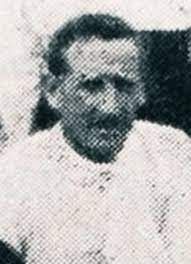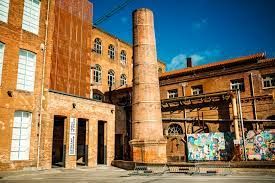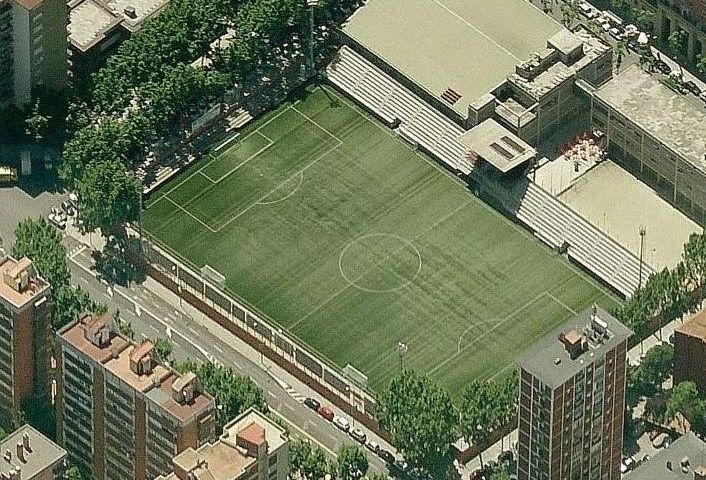The Mauchans

In early Spanish football, specifically in Barcelona, there is the known involvement of four Mauchans, of which Davie, pictured left, is only one. And there was confusion. It was thought that the same Davie had been born in Dumbarton but it has proved not to be the case. He was, in fact, Catalan-born, a Hispano-Scot, who, like his equivalent South American Diasporans, inherited his passion for the game from family, in this case his Scots-born father and siblings.
Thus the story in fact begins with his father, William. William Mauchan Snr. was born William Machan in 1855 in Pollokshaws on the banks of the White Cart. His own father was a bleacher. And in 1879 still in Glasgow but now in the centre he married Elizabeth Stewart. With her he would have seven children, three, William, Peter and Archibald born in Glasgow, William dying young, two, Elizabeth and John in England, and two more, David, himself, and a second William in the Sant Marti suburb of the Catalonian capital.
William Mauchan Snr's birth-date meant that he grew up not just in the heat of the explosion in the 1870s of football in the West of Scotland and in part also just a few hundred yards from its hub at Glasgow Green. He, following his father, also became a skilled textile worker, a cloth-finisher, and it was this that took him first to Nottingham and its lace-industry. He was in the city in 1891, having moved there about 1885. It was also lace that then took him Barcelona in the early 1890s, perhaps just too old to play football but still with a passion that would express itself through a refereeing qualification and in his growing and future sons.
In 1893 the Newmilns-based lace-makers, Johnston & Shields, in partnership with Nottingham-based Edward Steegmann, a footballer himself with Notts County, began lace production in San Marti. Forty workers mainly from the Ayrshire Irvine valley arrived to man the new facility and, amongst them it seems, the equally-Scots Mauchans, William now a foreman, were sent from the English Midlands. Indeed such was the Scots presence that the mill soon became known as La Escocesa, The Scot. The building is still there, now a centre for artists.
There, given the Scots passion for the game, football began almost immediately. That winter at least three games were played between a factory team, captained by Willie Gold from Newmilns itself, against Barcelona's English Colony, its involvement driven by James Reeves and George Cochran. However, Cochran would probably move to his employer's, the Paisley thread-makers, Coats, new mill inland at Borgonya in 1894 and Reeves left the city the following year so by 1895-6, whist William Snr. is known to have refereed matches in May 1895, official matches died away.

Yet, clearly football continued to be played and by the turn of the century the setting-up of an official team, Escoces F.C., based on La Escocesa and other local, Scots textile-workers, took place. It would be captained by Darvel's John Hamilton. William Mauchan Snr, would be its in-house official and his eldest, surviving son, 17/18 year-old Peter, a founder and team member. On 2nd February 1900 William Mauchan ran the line in Escoces first match. It was against also newly-formed multi-national Barcelona F.C. as was the second match, where Escoces combined with the strictly Catalan team, Catala. There Willie Mauchan took the whistle and in doing so became the first referee in Spain to issue a red-card, in fact two. Barcelona's Englishman, Sidney Harris, and Willie Gold clashed. Both were dismissed.
In Escoces' next game Mauchan seems to have been stood down. John Hamilton refereed and his place in the team seems to have been taken by a second Mauchan, presumably Archie, now aged 15/16 but by the end of the season the team because of external factors had folded with several of the players moving on. In January 1901 a Mauchan, Peter, was one of three in the Barcelona F.C. team that lost to Hispania, itself fielding two more. But he was not there the following season or ever again. William too had returned and again not without controversy. In April 1901 he refereed the final game of the first playing of the Copa Macaya, with Tom Shields of Johnston, Shields the President of the organising committee. Hispania played Barcelona. Hispania needed a draw to take the title. Barcelona conceded an own-goal. Its founder, Gamper, equalised and then Mauchan disallowed a second Barcelona goal for off-side. The match finished 1-1. Barcelona were less than happy, which seems more than a little petulant, seeing as William was not the only Mauchan on the field that day. The Barca eleven included Peter.
At this point William Mauchan Snr. seems to have stepped back from the game completely. Peter also stepped down as a player but he too turned to refereeing. With John Hamilton, its founder in 1902, he was an early member of the College of Catalan Referees. Meanwhile his younger brothers were taking up the game. In 1909, John, aged twenty, would be instrumental in the emergence of a second team from San Marti, Jupiter F.C. one that exists to this day. There he would be joined by David and William Jnr. and with longevity. The latter's connection with the game in Catalonia would continue for another forty years as the organisor of tours there by British teams, St. Mirren in 1927, Burnley in 1949, this whilst John's role would be recognised fifty years later as guest of honour when in 1959 Jupiter played FC Barcelona.

William Mauchan Snr. would have been sixty in 1915, sixty-five in 1920 and retirement took him back, and perhaps most of the younger family, not to Scotland but Nottingham. He would die there in 1927 at the age of seventy-two. Elizabeth, his wife, would follow him in 1943 in the same city. Peter had also returned and to England. He would marry in 1912 in Coventry, have a daughter there the following year and travel the world, notably to Spanish-speaking countries, for the next two decades at least as a Clerk cum Commercial Traveller cum Export Manager. Post the Great War it seems he and his family might have settled for several years in Colombia before returning to live in Halifax, Yorkshire. And it was there in 1943 that he would die, aged sixty-one. Archibald would also return and to Nottingham once more. He would die there in 1937 without having seemed to marry. John was the only one of the siblings to remain in Barcelona. Davie on his return would enlist during the Great War, perhaps return to Glasgow post-war, marry in 1942 in Kettering to Phyllis Cooke but die in Nottingham in 1964, aged sixty-nine. And William Jnr. did return to Glasgow. In 1918 in Calton, a stone's throw from where his elder brothers had been born, he, recorded as an optical lens grinder, married Jeanie Joyce. Two children, also William and Jean, were born in 1919 and 1920 with the four of them continuing to stay nearby at least until 1922. But then they too would move South, with by 1939 all four staying in Manchester. And it would be still in that city that Jean would die in 1966 and William precisely a decade later at the age of seventy-nine.
William Mauchan Snr
Birth Locator:
1855 - 16, New St., Pollockshaws, Glasgow
Residence Locations:
1881 - 23, Sydney St., Glasgow
1891 - 34, Bobbers Mill Rd., Nottingham
Peter Mauchan
Birth Locator:
1882 - 23, Sydney St., Glasgow
Residence Locations:
1919/21 - 10, Springfield Terrace, Coventry
1933/43 - 13, Rhodes St., Halifax, Yorkshire
Archibald Mauchan
Birth Locator:
John Mauchan
Birth Locator:
Nottingham
David Mauchan
Birth Locator:
Residence Locator:
1964 - 12, Haileybury Cres., West Bridgeford, Nottingham
William Mauchan Jnr.
Birth Locator:
Residence Locator:
1919 - 49, Whitevale St., Glasgow
1922 - 207, Slatefield St., Glasgow
Other Locations:
Back to the Spanish Trail
or the SFHG Home page